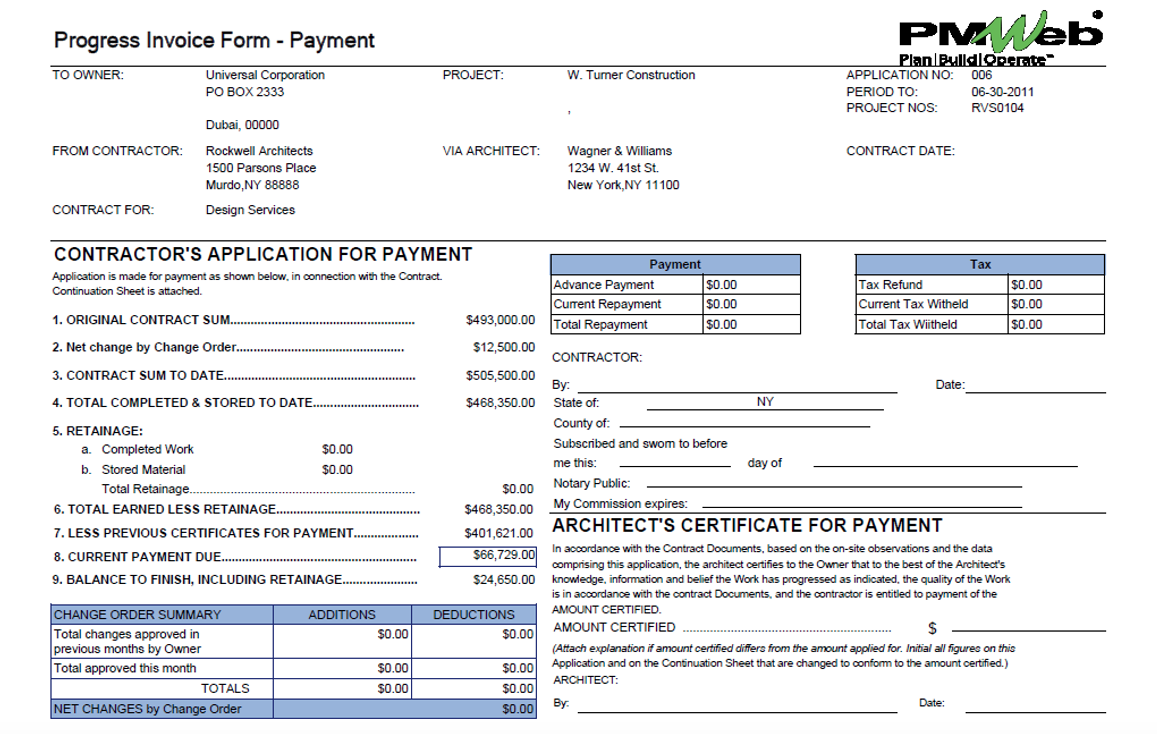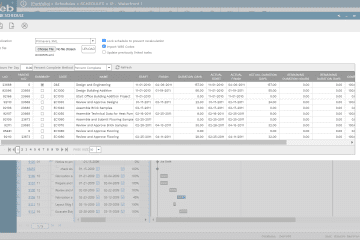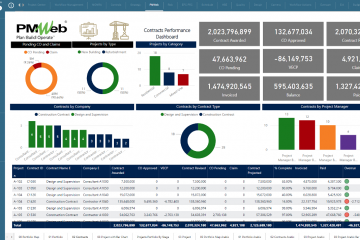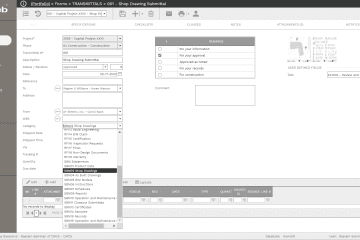Regardless of your project type or size, each project creates deliverables, which are simply the results of the project or the processes in the project. Using construction project management software can help streamline this process, that means a deliverable can be something as big as the objective of the project itself or the reporting that is part of the larger project. Deliverables could be a product or a service that, when completed, the Project Owner can use to monitor, evaluate and report the progress of the project. For each completed deliverable, there is a document to capture the details of the deliverable which needs to be formally reviewed and approved to formalize the deliverable’s completion and acceptance by the Project Owner. The acceptance of a deliverable is the perquisite to release the payment associated with that deliverable.
Project Management Information Systems (PMIS) like PMWeb are used to manage the complete project management processes as well as the project deliverables. To start with, each project needs to have a deliverable-focused work breakdown structure (WBS) to detail the project’s scope of work. The WBS is also the basis for creating the project schedule which details the different tasks and the sequence of those tasks to achieve the project’s deliverables. PMWeb scheduling module is used the create the project’s WBS and schedule activities as well as add the dependencies between those activities as well as add dependencies with other projects’ schedules in PMWeb.
In addition, there is the option to import the project schedule from Primavera P6 or MS Project. Importing the project schedule into PMWeb is a common practice if the schedule was created by the consultant or contractor as well as if the Project Owner use Primavera P6 or MS Project for their planning and scheduling processes. Regardless of what application is being used, the schedule data must be imported to PMWeb.
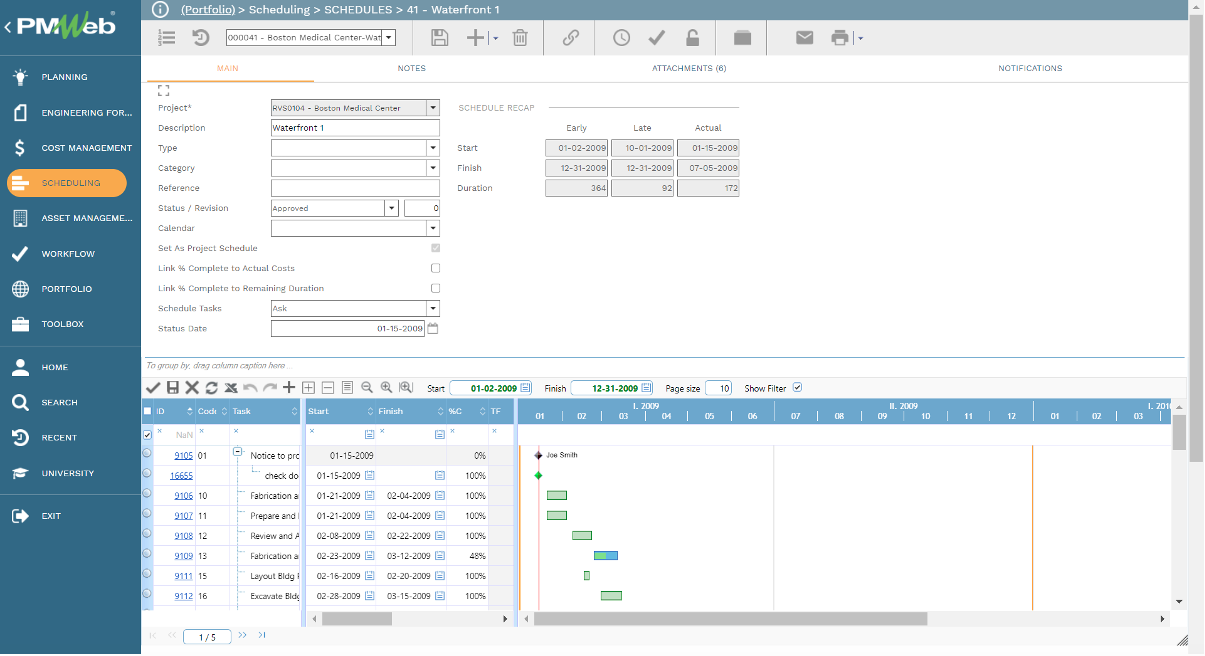
To ensure that the cost of project deliverables is aligned with the Project Owner’s overall cost reporting, it is a requirement to define the cost breakdown structure (CBS) which can be standard for all projects, for a program, or for a selected portfolio of projects or unique for every single project. PMWeb cost breakdown structure allows defining up to 16 levels of cost details although this is never used. For example, for generic projects that are being managed by the Enterprise Project Management Office (EPMO), there might be a need for a three-level cost breakdown structure. The first is for the project management processes group like Initiating, Planning, Executing, Monitoring and Controlling, and Closing whereas the second level is for the project management knowledge areas which include Scope, Time, Cost, Quality, Communication, Risk, Procurement, Human Resources, Stakeholders and Integration. The third level is project deliverables which are usually predefined.

To formalize the management of the submit, review, and approval process of project deliverables, a contract needs to be created between the Project Owner and the entity who are responsible for producing those products and services deliverables, also known as external deliverables. For internal projects, a contract is created between the Enterprise Project Management Office (EPMO) and the Project Manager who is responsible for producing those products and services deliverables, also known as internal deliverables.
A project could have more than one single contract depending on the project’s delivery strategy and who is involved in completing the project’s external and internal deliverables. Each contract agreement, regardless if the second part of the contract was an external entity or an internal project manager, the contract agreement must list all product and service deliverables that are part of the contract. Each deliverable is assigned its agreed monetary value as per the contract agreement. In case there is no monetary value for the contract agreement or deliverables, the contract total value is assumed to be 100 (to reflect the 100%) for which each deliverable is allocated to a weighted value from the 100%.
PMWeb commitment module is used to create all those contract agreements, external and internal, and the details of each product or service deliverable that is part of those contracts. Although PMWeb allows having lump and unit price contracts, nevertheless the option of lump sum contract is used as deliverables are usually specific and not recurring during the project duration. PMWeb also allows multi-currency in case the value for some deliverables, products, or services, could be in a different currency than others. Each deliverable is assigned the cost breakdown structure (CBS) value as defined earlier as well as the expected project period, or month, where this deliverable will be completed.
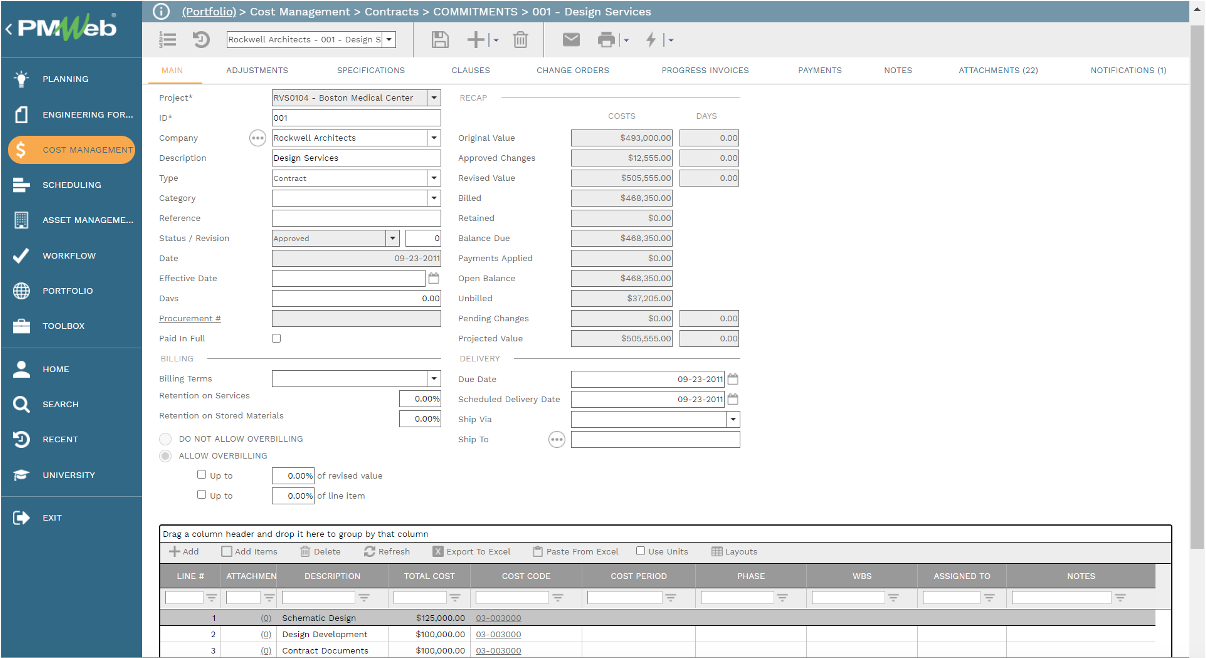
Some organizations might allow creating the deliverable document template, like for example the Project Charter, Stakeholder Assessment, and Assumption List among many others in third applications like MS Work, and MS Excel among others. This is a wrong practice as the knowledge included in those templates is stored in fragmented data silos where not only the knowledge associated with this valuable information is wasted but also has little control over data security and access permissions. Using PMWeb as the platform to develop the documents needed to review and approve those deliverables ensures that all generated data is stored in a secured single database where access rights and permissions are defined and controlled.
Although PMWeb comes ready with many out-of-the-box templates for some of the project deliverables like project cost estimates, project budgets, risk registers, and organization charts among others, nevertheless, there is always a need for many other documents that are not readily available in PMWeb. For those templates, PMWeb visual custom form builder is used to create those forms to provide the data fields and tables to capture this information. Similar to other PMWeb templates, permission access rights can be assigned to those who can access the template as well as the fields and tables that are part of each template with construction project management software, organizations can easily create customized templates as needed. It should be noted that those deliverable templates created in PMWeb can be in any language including non-Latin languages like the Arabic language.
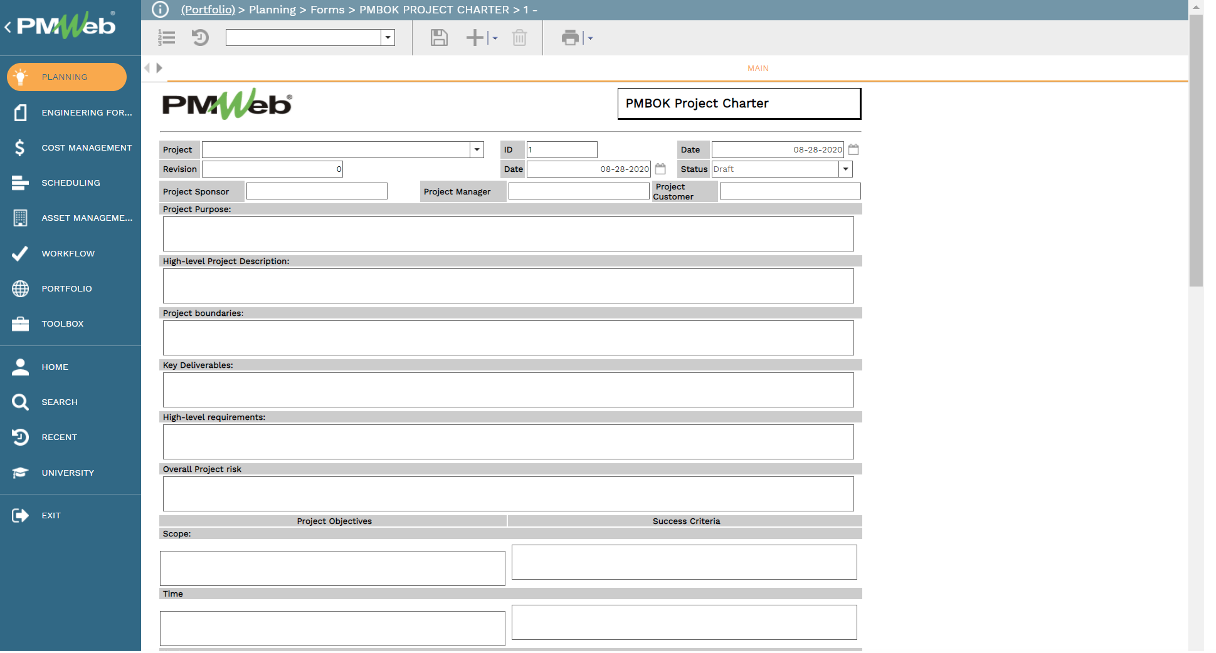
As the project progresses, the entities and individuals responsible for producing the project deliverables will perform all needed tasks to execute those deliverables. PMWeb progress invoice module is used to submit the interim payment certificate (IPC) for completed deliverables. Each line item in the progress invoice can be linked with its relevant project schedule activity which allows importing the percent completion of that activity into the progress invoice. In addition, PMWeb allows attaching all deliverable documents that were either uploaded and stored in the PMWeb document repository or uploaded directly to each line item to provide the needed proof of the completed and approved deliverable. PMWeb progress invoice module keeps track of issued invoices against each contract as well as automatically do the calculations of what was already invoiced and the balance due.
The payment tab which is part of the progress invoice module is used to capture the details of actual payments made against each approved interim payment certificate. This includes the amount actually paid as well as details of the actual payment made.
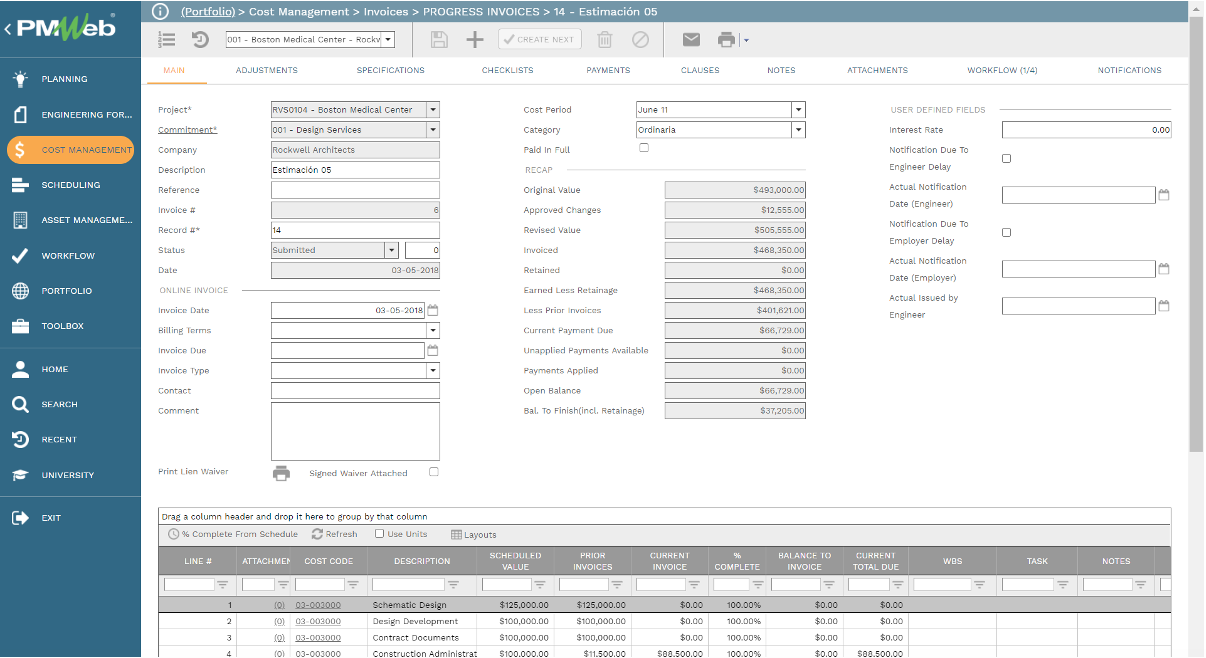
Similar to all contract agreements, changes could happen for varying reasons. For change orders that are due to project owner actions, the contractor or consultant could become entitled to a change order that could affect the awarded contract’s amount, completion date, or both. PMWeb provides two ready-to-use processes to manage those changes. The first is the potential change order which is also considered by many as an early warning notification of a change which if approved would lead to the second process which is the change order process. Those ready-to-use processes are used to capture the details of the change, cost, schedule impact, and other needed details.
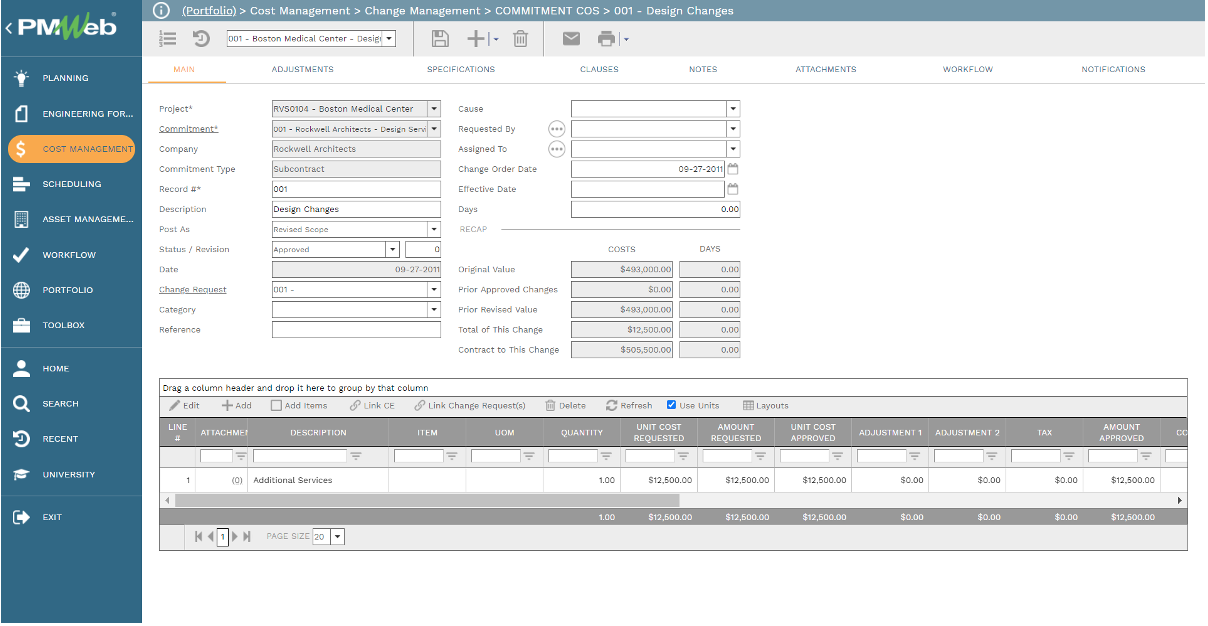
Similar to all other PMWeb project management processes, the approved baseline schedule, approved schedule updates, deliverables, baseline contract, potential change orders, change orders, and progress invoices can be attached with all supportive documents that are usually uploaded and stored in the PMWeb document management repository. In addition, links to relevant PMWeb records and imported MS Outlook emails can be added to each process transaction.
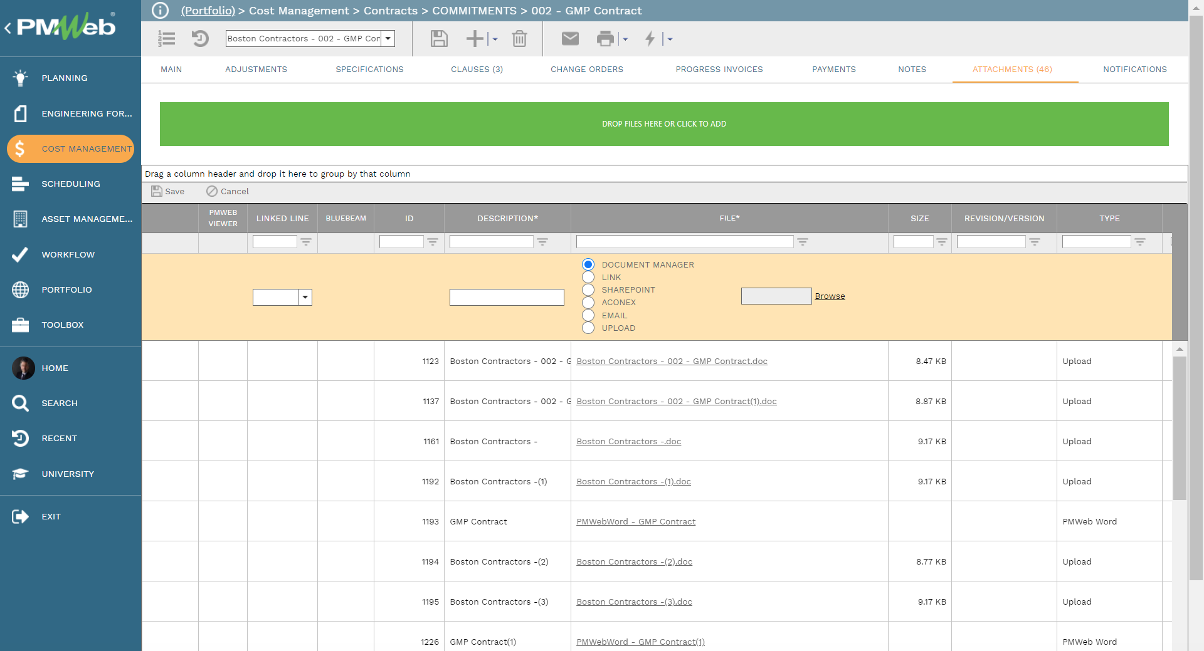
This workflow feature is essential in any robust construction project management software to ensure efficient project tracking. In addition, each process can be associated with a workflow to formalize the submit, review, and approve process. The workflow is used to map the workflow tasks, their sequence, duration, responsibility, conditions for resubmitting, and possible actions among others. The workflow could also have conditions to map the approval authority levels usually associated with financial transactions.
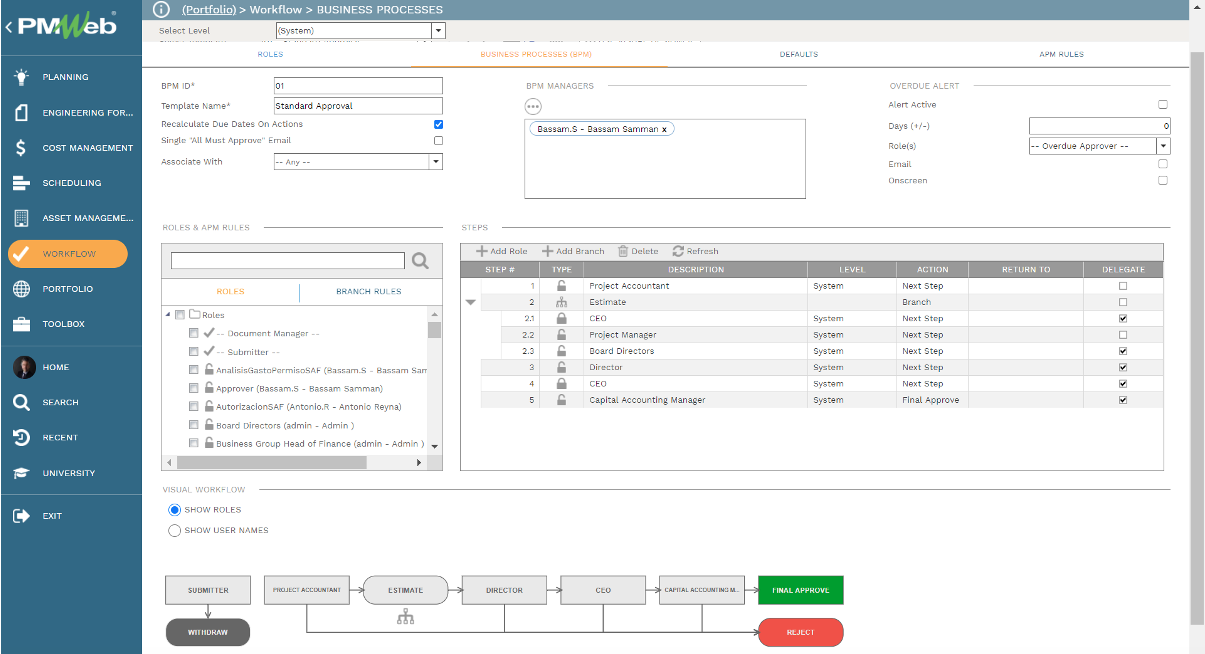
PMWeb comes ready with many output forms and reports for the different processes managed in PMWeb with the option for each entity to create its own output forms, reports, and dashboards in their desired form, format, and color branding. Those forms can be configured to be digitally signed using the PMWeb DocuSign integration module. In addition, the captured PMWeb data can be consumed by Business Intelligence and Data Visualization applications like MS Power BI to create interactive reports and dashboards. PMWeb reports and dashboards can be also designed to allow drill down to review information at the desired granular level.
